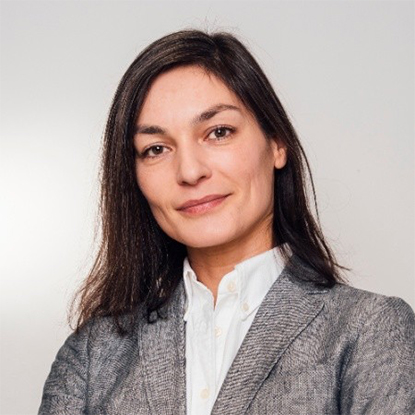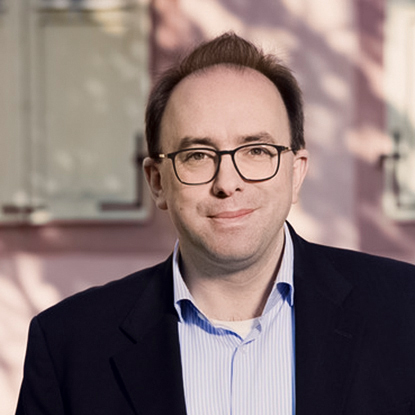-
![3D-Animation eines Forschungsgeräts]() Picture: T. Gottschall, B. Schröder/HZDR
Picture: T. Gottschall, B. Schröder/HZDR![3D-Animation eines Forschungsgeräts]() Picture: T. Gottschall, B. Schröder/HZDR
Picture: T. Gottschall, B. Schröder/HZDRIndustrial-scale magnetic cooling
2023/03/29
Magnetocaloric effect for more efficient hydrogen liquefaction
In the Horizon Europe project HyLICAL with a budget of about some five million euros, a team including the Helmholtz-Zentrum Dresden-Rossendorf (HZDR), TU Darmstadt and the start-up MAGNOTHERM wants to significantly improve the technologies for storing liquid hydrogen.
-
![Experimenteller Aufbau eines nichtlinearen Interferometers für "spukhafte" Quantenbildgebung mit nichtdetektiertem Licht.]() Picture: Walter Oppel
Picture: Walter Oppel![Experimenteller Aufbau eines nichtlinearen Interferometers für "spukhafte" Quantenbildgebung mit nichtdetektiertem Licht.]() Picture: Walter Oppel
Picture: Walter OppelTracking tumors with quantum optics
2023/02/08
Research team works on new tool for cancer diagnostics
Quantum imaging enables insights into previously invisible areas. Can tumour diagnostics also benefit from this? The TU Darmstadt, which has special expertise in quantum optics, is now investigating this question together with eight partners. The Quancer research project has a budget of 6.7 million euros and is being funded with 5.6 million euros in the framework programme “Quantum Technologies – from basic research to market” by the Federal Ministry of Education and Research (BMBF).
-
![]()
![]()
Basis for intelligent therapeutics
2023/02/06
Professor Heinz Koeppl involved in founding of new start-up Dirac Biosciences
A new start-up with significant participation of etit professor Heinz Koeppl is dedicated to the computer-aided design of innovative gene circuits in synthetic biology. In addition to Koeppl, partners of the new company Dirac Biosciences are the TU Darmstadt and the investment company eureKARE, which finances and develops innovations in the field of synthetic biology in Europe. The founding of the start-up was supported by the Innovation and Start-up Center HIGHEST of the TU Darmstadt.
-
![Porträtbild Prof. Dr. rer. nat. Leopoldo Molina-Luna , Leiter des Fachgebiets Elektronenmikroskopie am Fachbereich Materialwissenschaften und Geowissenschaften.]() Picture: Alexander Zintler
Picture: Alexander Zintler![Porträtbild Prof. Dr. rer. nat. Leopoldo Molina-Luna , Leiter des Fachgebiets Elektronenmikroskopie am Fachbereich Materialwissenschaften und Geowissenschaften.]() Picture: Alexander Zintler
Picture: Alexander ZintlerA look at the activity in electronic components
2023/01/31
Professor Leopoldo Molina-Luna receives ERC Consolidator Grant
In its current funding round, the European Research Council ERC has awarded Professor Leopoldo Molina-Luna a Consolidator Grant of around 2.1 million euros for his project “ELECTRON – Enabling spatially-resolved mapping of electric activity in operational devices at atomic-resolution”.
-
![]() Bild: Robert Roth/TURM Observatory
Bild: Robert Roth/TURM Observatory![]() Bild: Robert Roth/TURM Observatory
Bild: Robert Roth/TURM ObservatoryWinterspaziergang durch das Universum
2022/12/19
Virtuelle Reise zu weit entfernten Galaxien am 27. Dezember 2022
Zwischen den Jahren lädt das Hessische Clusterprojekt ELEMENTS gemeinsam mit der TU Darmstadt wieder auf einen Spaziergang der ganz besonderen Art ein: Wir erkunden am Dienstag, 27. Dezember 2022, ab 19:30 Uhr in einem digitalen Live-Stream das Universum!
-
![Zuoran Li]() Bild: Zuoran Li
Bild: Zuoran Li![Zuoran Li]() Bild: Zuoran Li
Bild: Zuoran Li„Fingerabdrücke“ von Pflanzen bestimmen
2022/12/09
TU-Forschungsprojekte zur geographischen Herkunft von Pflanzenölen
Herkömmliche Kraftstoffe auf Erdölbasis tragen erheblich zum Klimawandel bei, da bei ihrer Verbrennung fossiles Kohlendioxid (CO 2 ) frei wird. Biokraftstoffe aus nachwachsenden Rohstoffen, zum Beispiel aus Pflanzenölen, können hier Abhilfe schaffen. Als nachhaltige Energieträger sind sie jedoch nur sinnvoll, wenn ihre Ausgangsstoffe ökologisch verträglich angebaut werden und insbesondere keine Abholzung von Regenwäldern oder Trockenlegung von Mooren zur Bereitstellung der benötigten Anbauflächen stattfinden. Um dies sicherzustellen, ist ein Nachweis der genauen geographischen Herkunft nötig, der bislang noch nicht zur Verfügung steht. Forschende der TU Darmstadt haben nun einen Fingerabdruckansatz entwickelt, der zukünftig eine solche Bestimmung möglich machen soll.
-
![Strip-Caster, Anlage zur Herstellung von Ausgangsstoffen für die Magnetherstellung]() Bild: Fraunhofer IWKS
Bild: Fraunhofer IWKS![Strip-Caster, Anlage zur Herstellung von Ausgangsstoffen für die Magnetherstellung]() Bild: Fraunhofer IWKS
Bild: Fraunhofer IWKSEin neuartiges, nachhaltiges Herstellungsverfahren für Permanentmagnete
2022/11/24
Projekt Scale2PM der TU Darmstadt gemeinsam mit Fraunhofer IWKS gestartet
Die Versorgung und der Abbau von Seltenen Erden wird von der EU als sehr kritisch eingestuft. An diesem Punkt setzt das aktuell gestartete Projekt Scale2PM der TU Darmstadt gemeinsam mit der Fraunhofer-Einrichtung für Wertstoffkreisläufe und Ressourcenstrategie IWKS an: Ziel ist es, ein neuartiges Herstellungsverfahren zu validieren, um Permanentmagnete mit besseren oder gleichwertigen Eigenschaften bei verringertem Ressourceneinsatz zu produzieren.
-
![Dr. Xufei Fang in seinem Labor am Institut für Materialwissenschaft.]() Picture: Claus Völker
Picture: Claus Völker![Dr. Xufei Fang in seinem Labor am Institut für Materialwissenschaft.]() Picture: Claus Völker
Picture: Claus VölkerAtomic channels through the crystal
2022/11/22
ERC Starting Grant for TU project MECERDIS by materials scientist Dr Xufei Fang
The MECERDIS research project at the Technical University of Darmstadt is awarded an ERC Starting Grant by the European Research Council. Dr Xufei Fang's work is being funded with around 1.5 million euros. The TU materials scientist is researching improved ceramic materials that will enable new applications.
-
![Leroy Lüdicke und Guido Klees]() Bild: Leroy Lüdicke und Guido Klees
Bild: Leroy Lüdicke und Guido Klees![Leroy Lüdicke und Guido Klees]() Bild: Leroy Lüdicke und Guido Klees
Bild: Leroy Lüdicke und Guido KleesJunge Menschen für Naturwissenschaft begeistern
2022/11/11
Merck – TU Darmstadt Lernlabor Biologie bezieht neue Räumlichkeiten
Das Merck – TU Darmstadt Lernlabor Biologie ist deutlich erweitert worden. Die Mitarbeitenden bezogen großzügige neue Räumlichkeiten in einem Neubau auf dem Campus Botanischer Garten, zudem wurde der bereits bestehende Laborbereich im Nachbargebäude modernisiert und vergrößert. Das neue Gebäude im Forschungsschwerpunkt „Synthetische Biologie“ wurde heute offiziell eingeweiht.
-
![Dr. Tino Gottschall vom Hochfeld-Magnetlabor Dresden des HZDR ist Experte für die magnetische Kühlung.]() Picture: HZDR/ Rainer Weisflog
Picture: HZDR/ Rainer Weisflog![Dr. Tino Gottschall vom Hochfeld-Magnetlabor Dresden des HZDR ist Experte für die magnetische Kühlung.]() Picture: HZDR/ Rainer Weisflog
Picture: HZDR/ Rainer WeisflogSustainable magnets
2022/10/11
Joint project PUMA supports the energy transition
Powerful magnets can be used for effective cooling, heat and power generation. They make a decisive contribution to the energy transition. A consortium led by the University of Duisburg-Essen (UDE) is therefore researching new magnetic materials that are efficient and environmentally compatible. Partners in the PUMA project are the Technical University of Darmstadt and the Helmholtz-Zentrum Dresden-Rossendorf (HZDR). The German Federal Ministry of Education and Research is funding PUMA with two million euros for four years starting in October.
Research Field M+M
Archive
Archive






















